|
What's been added in RPN-55
Selling for the same price ($395) as the HP-45 two years earlier, the HP-55 offered more registers, more conversions, and programmability. In addition, it featured the timer already implemented in the HP-45, but not made officially available to the user due to its pure accuracy and stability. The HP-55 solved this by adding a quartz-controlled oscillator.
RPN-55 SD enhances the HP-55 in many ways:
MEMORY |
HP-55 |
RPN-55 |
| Register Arithmetic |
For STO operations on primary registers only
|
For both STO and RCL operations on all 20 registers, including the double-register ∑+ (R.1 and R.3) working with stack registers X and Y. |
| Volatility |
Program and all registers lost on power-off |
Program and all registers preserved ("continuous memory") |
| |
|
|
| TIMER |
|
|
| Range |
100 hours |
12, 24, 100 hours |
| CLx key |
Resets timer to 0 |
100 hr: Resets timer to 0
12/24 hr: Sets timer to actual time |
| ENTER key |
No effect |
100 hr: No effect
12/24 hr: Toggle date display |
| |
|
|
| FUNCTIONS |
|
| r |
Not available |
Correlation coefficient |
| x̂ |
Not available |
x-estimate for given y |
| ENG |
Not available |
SCI mode with exponent fixed to multiples of 3 |
| ABS |
Not available |
Make X value positive |
| INT |
Not available |
Integer part of X |
| FRC |
Not available |
Remove integer part of X |
| RND |
Not available |
Round X to displayed value |
| RAND |
Not available |
Create fractional or integer random number, as defined in Settings |
| P≷S |
Not available |
Swap primary and secondary registers |
| |
|
|
| FUNCTIONS (with setting Replace Unit Conversions set to ON) |
| sinh, sinh-1 |
Not available |
Hyperbolic sine and inverse |
| cosh, cosh-1 |
Not available |
Hyperbolic cosine and inverse |
| tanh, tanh-1 |
Not available |
Hyperbolic tangent and inverse |
| LOGy |
Not available |
Base y logarithm of x |
| LN x! |
Not available |
Logarithm of factorial of x |
| ∆% |
Not available |
Percent difference from y to x |
| %∑ |
Not available |
x as percentage of register ∑x |
| PUSH |
Not available |
Saves the entire stack on a 4-level stack |
| POP |
Not available |
Replaces the stack with the last PUSHed values (0 if none) |
| UNITS |
Not available |
Temporarily reveals the unit conversions until one of them has been executed.
This also works as part of a program. |
| PSE |
Not available |
Pauses program execution for one second. |
| |
|
|
| PROGRAMMING |
|
|
| Capabilities |
49 steps
Editing by replacing steps |
99 steps
Insert and delete steps with automatic address correction |
| Clear Program |
Not available |
Yes, with user confirmation |
| Clear Program Range |
Not available |
Clear any block of steps with automatic address correction |
| Delete f or g key |
Cumbersome |
Yes, by entering f or g again |
| |
|
|
| USER INTERFACE |
|
|
| Prefix keys |
Active if pressed |
Active if pressed. Deactivated if pressed again. Indicators show state. |
| Register view |
Not available |
All registers shown on single screen including formatted display.
Run/Stop and single-step program without leaving register view.
Store and recall split times by tapping split number. |
Decimal Point,
Thousands separator |
Fixed to decimal point (DP).
Thousands separator not available |
User-selectable, DP or comma.
Thousands separator optional |
| Angular mode indicator |
Not available |
When not DEG, mode is shown in the top-left corner of the display. |
| Command display |
Not available |
In program mode or while single-stepping, current command is shown as text below display |
| Current step number display |
Not available |
Current program step number is optionally shown below display |
| Program memory fill status |
Not available |
Red progress bar shows amount of program memory filled |
| Low battery |
Lights all decimal points |
Lights all decimal points in vintage mode.
Lights a small red indicator in extended mode.
(When iPhone charge < 10%.) |
Switching to timer mode with x = 43.170992:
1. Vintage mode (100-hr only)
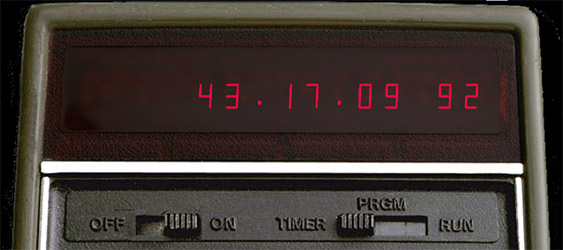
2. Extended mode 100-hr:
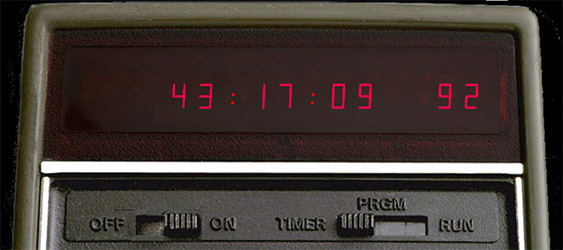
3. Extended mode 24-hr:
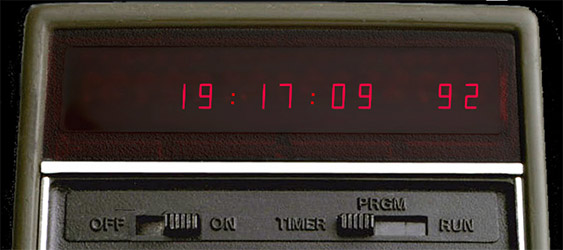
4. Extended mode 12-hr:
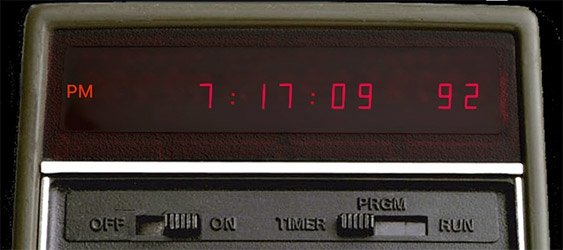
5. Date with weekday number:

6. Date with localized weekday name
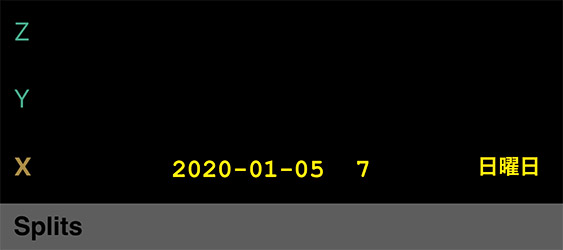
|
| |
|
|
Importing Numeric Data |
| |
|
|
|
| |
|
|
You can preset RPN55's registers with data created externally without having to type them in. |
| |
|
|
Simply prepare the data in text format in any app that can handle text, like Notes, Mail and many others. |
| |
|
|
|
| |
|
|
The data format looks like this: |
| |
|
|
Rn or R.n value (where n = 0…9) |
| |
|
|
|
| |
|
|
Example:
To set R1 = 4.5, R6 = 6.28E-7, R.3 = 439, prepare your data like this: |
| |
|
|
R1 4.5
R6 6.28e-7
R.3 439
|
| |
|
|
Select all of the text and paste. |
| |
|
|
|
| |
|
|
Notes:
Upper-/lower-case is ignored.
One or more blanks or tabs may follow the register number.
M may be used in place of R.
R.n may also be written as R1n, e.g. R.3 is the same as R13.
The order of the registers is irrelevant.
Unlisted registers are left untouched.
|

| |
|
|
Extra Functions |
| |
|
|
|
| |
|
|
r |
| |
|
|
Calculates the correlation coefficient for a linear regression.
Note that the method shown on page 61 of the Owner's Handbook calculates coefficient of determination, which is the
square of r. |
| |
|
|
|
| |
|
|
ABS |
| |
|
|
Sets x to the positive value of x. |
| |
|
|
|
| |
|
|
INT |
| |
|
|
Sets the fractional part of x to 0. |
| |
|
|
|
| |
|
|
FRC |
| |
|
|
Sets the integer part of x to 0. |
| |
|
|
|
| |
|
|
RND |
| |
|
|
Rounds x to the value currently shown on the display. |
| |
|
|
|
| |
|
|
RAND |
| |
|
|
• If the RAND setting is Off:
Creates a random number between 0 (incl.) and 1 (excl.).
• If the RAND setting is On:
x ≤ 0: creates an integer random number in the range 0…2³²–1.
x > 0: creates an integer random number less than x, but no larger than 2³²–1. |
| |
|
|
|
| |
|
|
P≷S |
| |
|
|
Swaps registers R0…R9 with registers R.0…R.9. |
| |
|
|
|
| |
|
|
LN x! |
| |
|
|
Calculates logarithm of factorial.
This function allows handling factorials of very large numbers, as may occur
in statistical computations. By using the logarithm of these factorials,
multiplication and division are reduced to addition and subtraction.
On return:
x = LN x!
y = mantissa of x!
z = exponent of x!
(assuming x! = y·10z)
z+1 = number of digits of x!
x may be any positive number up to
4.4673259 × 10⁹⁷.
|
| |
|
|
|
| |
|
|
∆% |
| |
|
|
Calculates the percent difference between y and x. The stack doesn't drop.
|
| |
|
|
|
| |
|
|
%∑ |
| |
|
|
Calculates the percentage x is of the value in the ∑x register (R.1) |
| |
|
|
|
| |
|
|
PUSH |
| |
|
|
Copies all four registers of the stack to an internal stack of stacks. Four levels are available. |
| |
|
|
|
| |
|
|
POP |
| |
|
|
Retrieves the latest PUSHed copy of the stack. The current x value is saved in LastX. The oldest copy of the stack is copied down on the internal stack.
NOTE that CL.R clears the stack of stacks, while CL R does not. You can use P≷S CL R P≷S to clear the
secondary registers without affecting the stack of stacks. |
| |
|
|
|
| |
|
|
UNITS |
| |
|
|
Example:
Calculate the base 2 logarithm of 5 inches converted to millimeters.
2 ENTER 5
f UNITS
g in➞mm
f LOGy
Result: 6.99
This sequence also works as part of a program.
|
| |
|
|
|
| |
|
|
PSE |
| |
|
|
Executes a one-second pause. A green indicator lights up while the pause is active. |

| |
|
|
Timer |
| |
|
|
|
| |
|
|
Operation |
| |
|
|
When you switch to timer mode, the current value of x is taken as the starting time.
If the value is an invalid time, 0 will be shown. Invalid starting times are negative numbers, or times equal to or larger than 100 hours (or 24 hours),
or more than 59 minutes in the minutes field, or more than 59.9999 seconds in the seconds field.
When leaving timer mode, the actual mode switching doesn't occur until the timer has been stopped by R/S. |
| |
|
|
|
| |
|
|
R/S |
| |
|
|
Press key to start and stop the timer. This also works in register view. |
| |
|
|
|
| |
|
|
CLx |
| |
|
|
100-hours mode: resets the time to zero.
12 and 24 hours: sets the time to the current real time. |
| |
|
|
|
| |
|
|
EEX |
| |
|
|
Shows or hides the hundredths digits. |
| |
|
|
|
| |
|
|
ENTER |
| |
|
|
Toggles between date and time display.
Date separators blink while the timer is running.
Split times may be stored, but not recalled, while the date is shown.
Weekdays follow the ISO rules where Monday = 1, Sunday = 7. |
| |
|
|
|
| |
|
|
Split Times |
| |
|
|
Pressing any digit key 0…9 while the timer is running stores the current time in the corresponding register.
Pressing any digit key 0…9 with the timer stopped retrieves the stored time from the corresponding register, except when the date is shown.
In register view, press any split time instead.
Non-zero values are highlighted in extended mode.
Split times are still available after leaving timer mode.
|
|